Evidence-Based Healthcare Management: Application and Reflection
VerifiedAdded on 2023/03/21
|8
|1881
|73
Essay
AI Summary
This essay provides a personal view on evidence-based healthcare management, emphasizing its importance in improving patient outcomes and healthcare quality. It discusses the application of evidence-based practices in professional settings, highlighting the need to challenge outdated policies and promote effective management strategies. The essay also explores how liberal arts and health sciences courses contribute to understanding evidence-based practice, equipping individuals with the skills to collect and implement research findings. Furthermore, it reflects on how understanding evidence-based practice has fostered personal growth and a commitment to improving healthcare service management by prioritizing patient care and utilizing resources effectively. The author concludes that combining theoretical knowledge with proven practices is crucial for success in healthcare management.
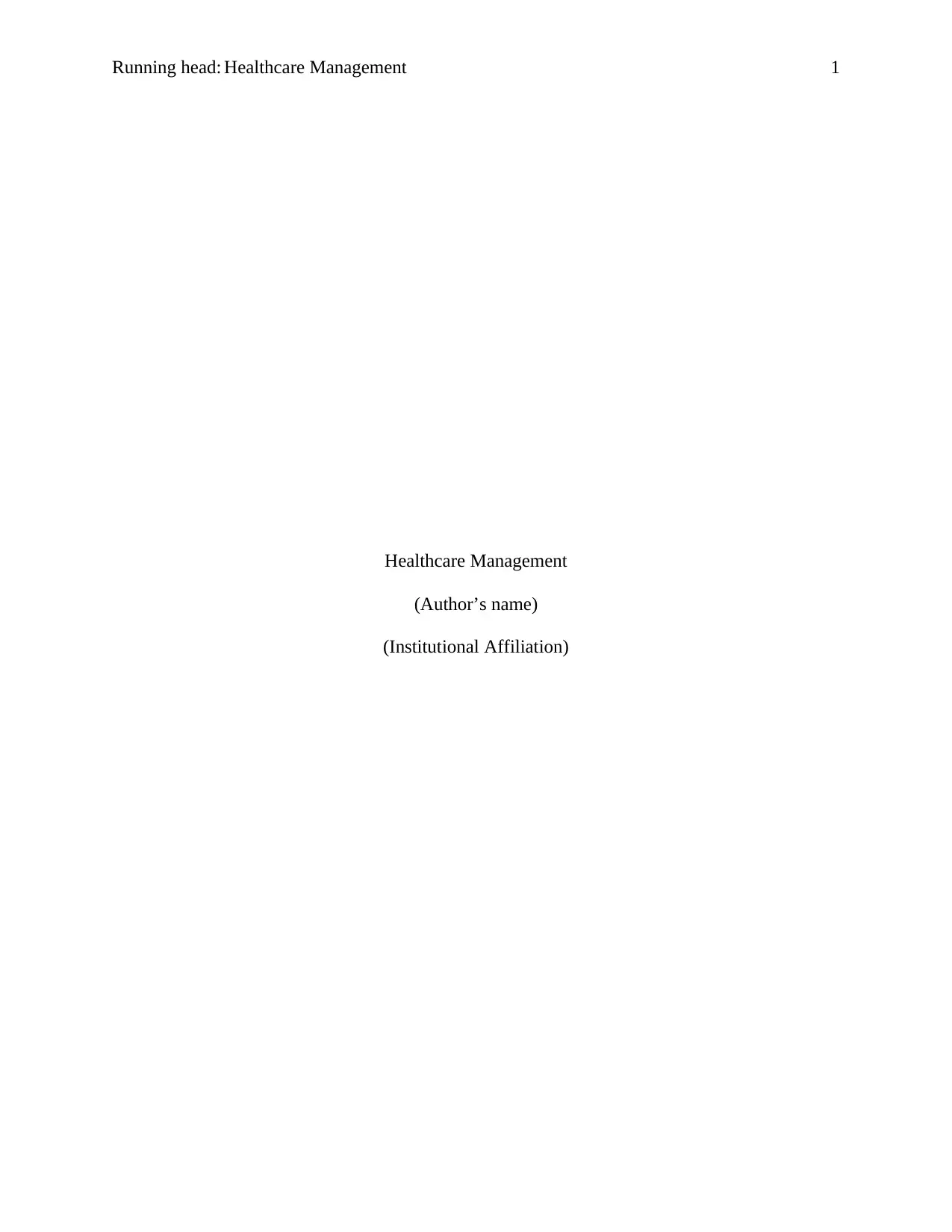
Running head: Healthcare Management 1
Healthcare Management
(Author’s name)
(Institutional Affiliation)
Healthcare Management
(Author’s name)
(Institutional Affiliation)
Secure Best Marks with AI Grader
Need help grading? Try our AI Grader for instant feedback on your assignments.
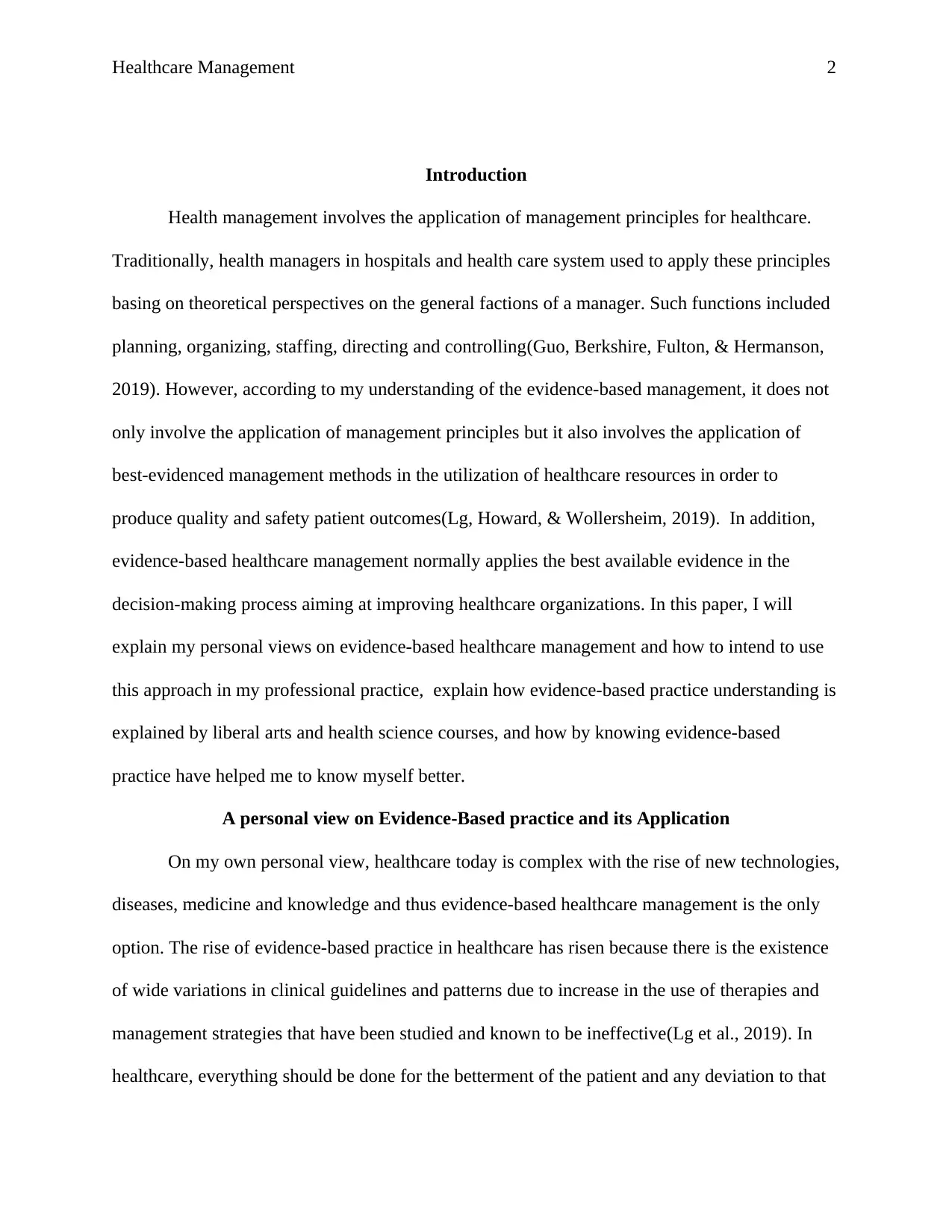
Healthcare Management 2
Introduction
Health management involves the application of management principles for healthcare.
Traditionally, health managers in hospitals and health care system used to apply these principles
basing on theoretical perspectives on the general factions of a manager. Such functions included
planning, organizing, staffing, directing and controlling(Guo, Berkshire, Fulton, & Hermanson,
2019). However, according to my understanding of the evidence-based management, it does not
only involve the application of management principles but it also involves the application of
best-evidenced management methods in the utilization of healthcare resources in order to
produce quality and safety patient outcomes(Lg, Howard, & Wollersheim, 2019). In addition,
evidence-based healthcare management normally applies the best available evidence in the
decision-making process aiming at improving healthcare organizations. In this paper, I will
explain my personal views on evidence-based healthcare management and how to intend to use
this approach in my professional practice, explain how evidence-based practice understanding is
explained by liberal arts and health science courses, and how by knowing evidence-based
practice have helped me to know myself better.
A personal view on Evidence-Based practice and its Application
On my own personal view, healthcare today is complex with the rise of new technologies,
diseases, medicine and knowledge and thus evidence-based healthcare management is the only
option. The rise of evidence-based practice in healthcare has risen because there is the existence
of wide variations in clinical guidelines and patterns due to increase in the use of therapies and
management strategies that have been studied and known to be ineffective(Lg et al., 2019). In
healthcare, everything should be done for the betterment of the patient and any deviation to that
Introduction
Health management involves the application of management principles for healthcare.
Traditionally, health managers in hospitals and health care system used to apply these principles
basing on theoretical perspectives on the general factions of a manager. Such functions included
planning, organizing, staffing, directing and controlling(Guo, Berkshire, Fulton, & Hermanson,
2019). However, according to my understanding of the evidence-based management, it does not
only involve the application of management principles but it also involves the application of
best-evidenced management methods in the utilization of healthcare resources in order to
produce quality and safety patient outcomes(Lg, Howard, & Wollersheim, 2019). In addition,
evidence-based healthcare management normally applies the best available evidence in the
decision-making process aiming at improving healthcare organizations. In this paper, I will
explain my personal views on evidence-based healthcare management and how to intend to use
this approach in my professional practice, explain how evidence-based practice understanding is
explained by liberal arts and health science courses, and how by knowing evidence-based
practice have helped me to know myself better.
A personal view on Evidence-Based practice and its Application
On my own personal view, healthcare today is complex with the rise of new technologies,
diseases, medicine and knowledge and thus evidence-based healthcare management is the only
option. The rise of evidence-based practice in healthcare has risen because there is the existence
of wide variations in clinical guidelines and patterns due to increase in the use of therapies and
management strategies that have been studied and known to be ineffective(Lg et al., 2019). In
healthcare, everything should be done for the betterment of the patient and any deviation to that
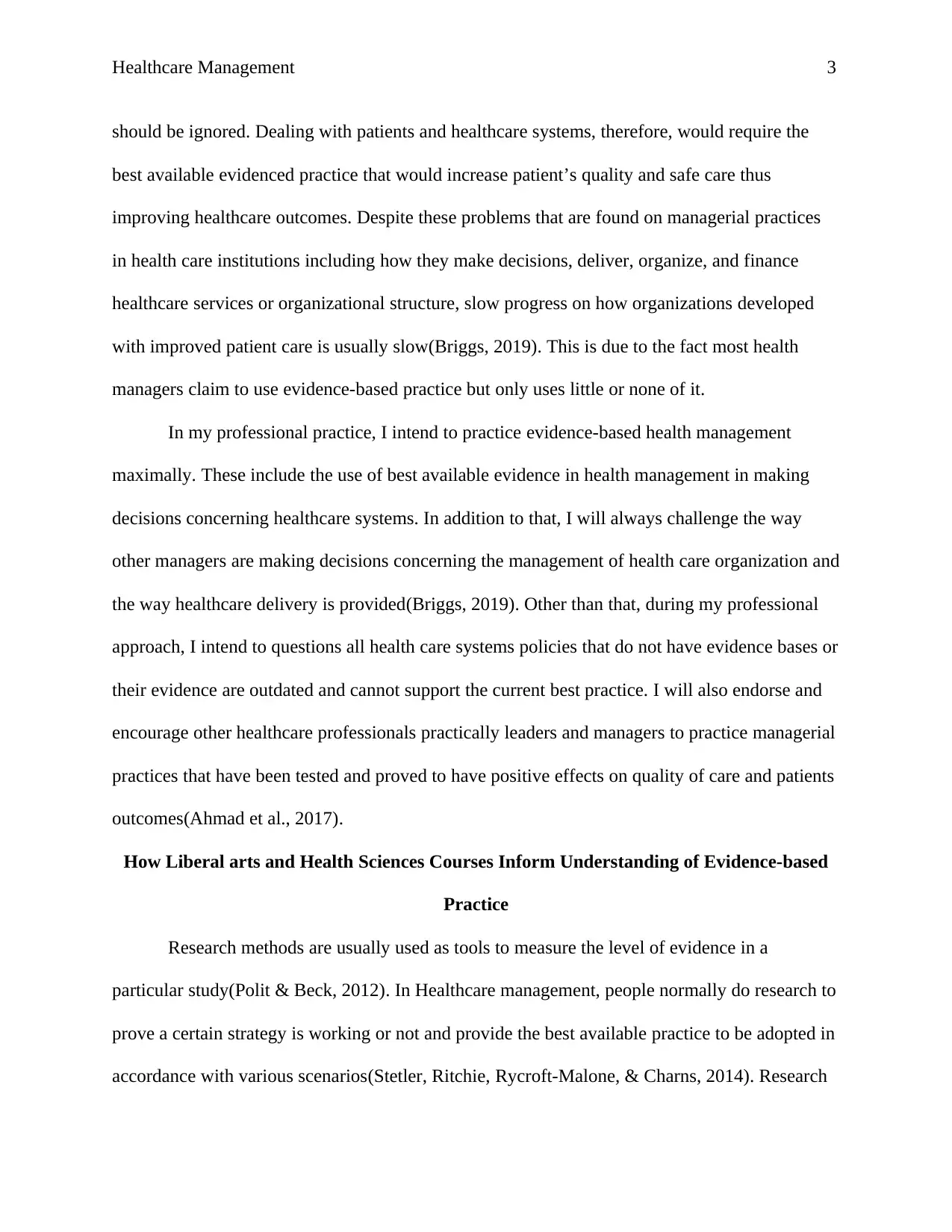
Healthcare Management 3
should be ignored. Dealing with patients and healthcare systems, therefore, would require the
best available evidenced practice that would increase patient’s quality and safe care thus
improving healthcare outcomes. Despite these problems that are found on managerial practices
in health care institutions including how they make decisions, deliver, organize, and finance
healthcare services or organizational structure, slow progress on how organizations developed
with improved patient care is usually slow(Briggs, 2019). This is due to the fact most health
managers claim to use evidence-based practice but only uses little or none of it.
In my professional practice, I intend to practice evidence-based health management
maximally. These include the use of best available evidence in health management in making
decisions concerning healthcare systems. In addition to that, I will always challenge the way
other managers are making decisions concerning the management of health care organization and
the way healthcare delivery is provided(Briggs, 2019). Other than that, during my professional
approach, I intend to questions all health care systems policies that do not have evidence bases or
their evidence are outdated and cannot support the current best practice. I will also endorse and
encourage other healthcare professionals practically leaders and managers to practice managerial
practices that have been tested and proved to have positive effects on quality of care and patients
outcomes(Ahmad et al., 2017).
How Liberal arts and Health Sciences Courses Inform Understanding of Evidence-based
Practice
Research methods are usually used as tools to measure the level of evidence in a
particular study(Polit & Beck, 2012). In Healthcare management, people normally do research to
prove a certain strategy is working or not and provide the best available practice to be adopted in
accordance with various scenarios(Stetler, Ritchie, Rycroft-Malone, & Charns, 2014). Research
should be ignored. Dealing with patients and healthcare systems, therefore, would require the
best available evidenced practice that would increase patient’s quality and safe care thus
improving healthcare outcomes. Despite these problems that are found on managerial practices
in health care institutions including how they make decisions, deliver, organize, and finance
healthcare services or organizational structure, slow progress on how organizations developed
with improved patient care is usually slow(Briggs, 2019). This is due to the fact most health
managers claim to use evidence-based practice but only uses little or none of it.
In my professional practice, I intend to practice evidence-based health management
maximally. These include the use of best available evidence in health management in making
decisions concerning healthcare systems. In addition to that, I will always challenge the way
other managers are making decisions concerning the management of health care organization and
the way healthcare delivery is provided(Briggs, 2019). Other than that, during my professional
approach, I intend to questions all health care systems policies that do not have evidence bases or
their evidence are outdated and cannot support the current best practice. I will also endorse and
encourage other healthcare professionals practically leaders and managers to practice managerial
practices that have been tested and proved to have positive effects on quality of care and patients
outcomes(Ahmad et al., 2017).
How Liberal arts and Health Sciences Courses Inform Understanding of Evidence-based
Practice
Research methods are usually used as tools to measure the level of evidence in a
particular study(Polit & Beck, 2012). In Healthcare management, people normally do research to
prove a certain strategy is working or not and provide the best available practice to be adopted in
accordance with various scenarios(Stetler, Ritchie, Rycroft-Malone, & Charns, 2014). Research
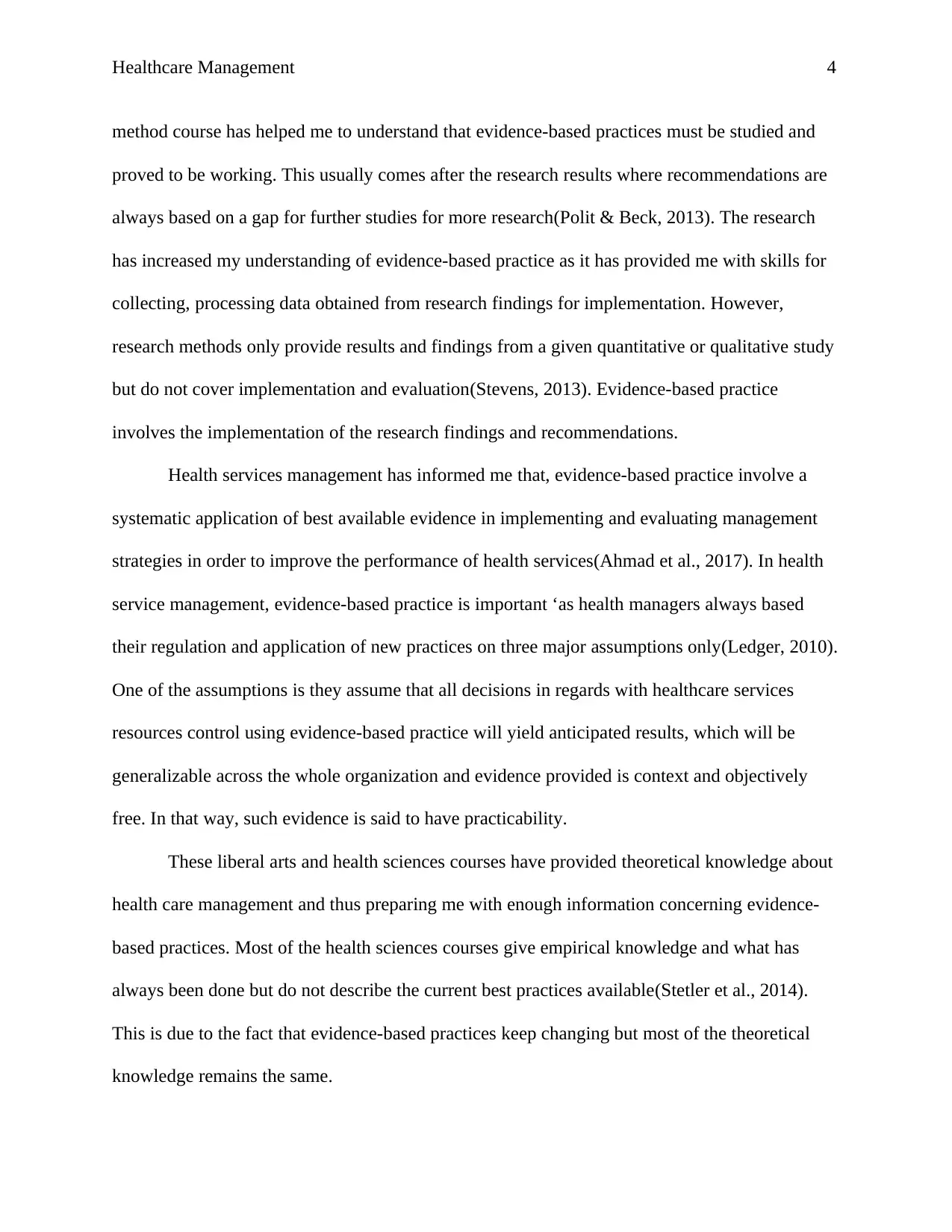
Healthcare Management 4
method course has helped me to understand that evidence-based practices must be studied and
proved to be working. This usually comes after the research results where recommendations are
always based on a gap for further studies for more research(Polit & Beck, 2013). The research
has increased my understanding of evidence-based practice as it has provided me with skills for
collecting, processing data obtained from research findings for implementation. However,
research methods only provide results and findings from a given quantitative or qualitative study
but do not cover implementation and evaluation(Stevens, 2013). Evidence-based practice
involves the implementation of the research findings and recommendations.
Health services management has informed me that, evidence-based practice involve a
systematic application of best available evidence in implementing and evaluating management
strategies in order to improve the performance of health services(Ahmad et al., 2017). In health
service management, evidence-based practice is important ‘as health managers always based
their regulation and application of new practices on three major assumptions only(Ledger, 2010).
One of the assumptions is they assume that all decisions in regards with healthcare services
resources control using evidence-based practice will yield anticipated results, which will be
generalizable across the whole organization and evidence provided is context and objectively
free. In that way, such evidence is said to have practicability.
These liberal arts and health sciences courses have provided theoretical knowledge about
health care management and thus preparing me with enough information concerning evidence-
based practices. Most of the health sciences courses give empirical knowledge and what has
always been done but do not describe the current best practices available(Stetler et al., 2014).
This is due to the fact that evidence-based practices keep changing but most of the theoretical
knowledge remains the same.
method course has helped me to understand that evidence-based practices must be studied and
proved to be working. This usually comes after the research results where recommendations are
always based on a gap for further studies for more research(Polit & Beck, 2013). The research
has increased my understanding of evidence-based practice as it has provided me with skills for
collecting, processing data obtained from research findings for implementation. However,
research methods only provide results and findings from a given quantitative or qualitative study
but do not cover implementation and evaluation(Stevens, 2013). Evidence-based practice
involves the implementation of the research findings and recommendations.
Health services management has informed me that, evidence-based practice involve a
systematic application of best available evidence in implementing and evaluating management
strategies in order to improve the performance of health services(Ahmad et al., 2017). In health
service management, evidence-based practice is important ‘as health managers always based
their regulation and application of new practices on three major assumptions only(Ledger, 2010).
One of the assumptions is they assume that all decisions in regards with healthcare services
resources control using evidence-based practice will yield anticipated results, which will be
generalizable across the whole organization and evidence provided is context and objectively
free. In that way, such evidence is said to have practicability.
These liberal arts and health sciences courses have provided theoretical knowledge about
health care management and thus preparing me with enough information concerning evidence-
based practices. Most of the health sciences courses give empirical knowledge and what has
always been done but do not describe the current best practices available(Stetler et al., 2014).
This is due to the fact that evidence-based practices keep changing but most of the theoretical
knowledge remains the same.
Secure Best Marks with AI Grader
Need help grading? Try our AI Grader for instant feedback on your assignments.
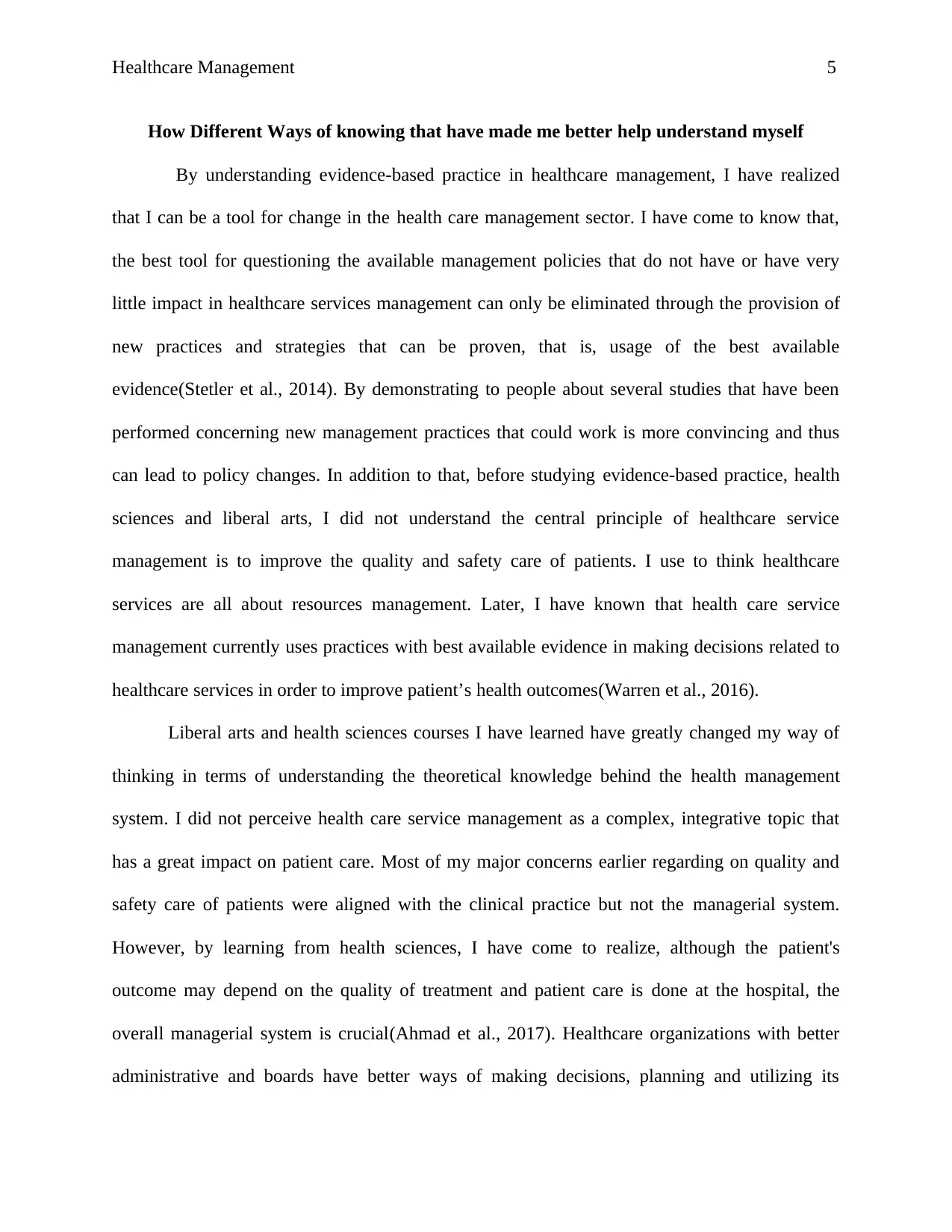
Healthcare Management 5
How Different Ways of knowing that have made me better help understand myself
By understanding evidence-based practice in healthcare management, I have realized
that I can be a tool for change in the health care management sector. I have come to know that,
the best tool for questioning the available management policies that do not have or have very
little impact in healthcare services management can only be eliminated through the provision of
new practices and strategies that can be proven, that is, usage of the best available
evidence(Stetler et al., 2014). By demonstrating to people about several studies that have been
performed concerning new management practices that could work is more convincing and thus
can lead to policy changes. In addition to that, before studying evidence-based practice, health
sciences and liberal arts, I did not understand the central principle of healthcare service
management is to improve the quality and safety care of patients. I use to think healthcare
services are all about resources management. Later, I have known that health care service
management currently uses practices with best available evidence in making decisions related to
healthcare services in order to improve patient’s health outcomes(Warren et al., 2016).
Liberal arts and health sciences courses I have learned have greatly changed my way of
thinking in terms of understanding the theoretical knowledge behind the health management
system. I did not perceive health care service management as a complex, integrative topic that
has a great impact on patient care. Most of my major concerns earlier regarding on quality and
safety care of patients were aligned with the clinical practice but not the managerial system.
However, by learning from health sciences, I have come to realize, although the patient's
outcome may depend on the quality of treatment and patient care is done at the hospital, the
overall managerial system is crucial(Ahmad et al., 2017). Healthcare organizations with better
administrative and boards have better ways of making decisions, planning and utilizing its
How Different Ways of knowing that have made me better help understand myself
By understanding evidence-based practice in healthcare management, I have realized
that I can be a tool for change in the health care management sector. I have come to know that,
the best tool for questioning the available management policies that do not have or have very
little impact in healthcare services management can only be eliminated through the provision of
new practices and strategies that can be proven, that is, usage of the best available
evidence(Stetler et al., 2014). By demonstrating to people about several studies that have been
performed concerning new management practices that could work is more convincing and thus
can lead to policy changes. In addition to that, before studying evidence-based practice, health
sciences and liberal arts, I did not understand the central principle of healthcare service
management is to improve the quality and safety care of patients. I use to think healthcare
services are all about resources management. Later, I have known that health care service
management currently uses practices with best available evidence in making decisions related to
healthcare services in order to improve patient’s health outcomes(Warren et al., 2016).
Liberal arts and health sciences courses I have learned have greatly changed my way of
thinking in terms of understanding the theoretical knowledge behind the health management
system. I did not perceive health care service management as a complex, integrative topic that
has a great impact on patient care. Most of my major concerns earlier regarding on quality and
safety care of patients were aligned with the clinical practice but not the managerial system.
However, by learning from health sciences, I have come to realize, although the patient's
outcome may depend on the quality of treatment and patient care is done at the hospital, the
overall managerial system is crucial(Ahmad et al., 2017). Healthcare organizations with better
administrative and boards have better ways of making decisions, planning and utilizing its
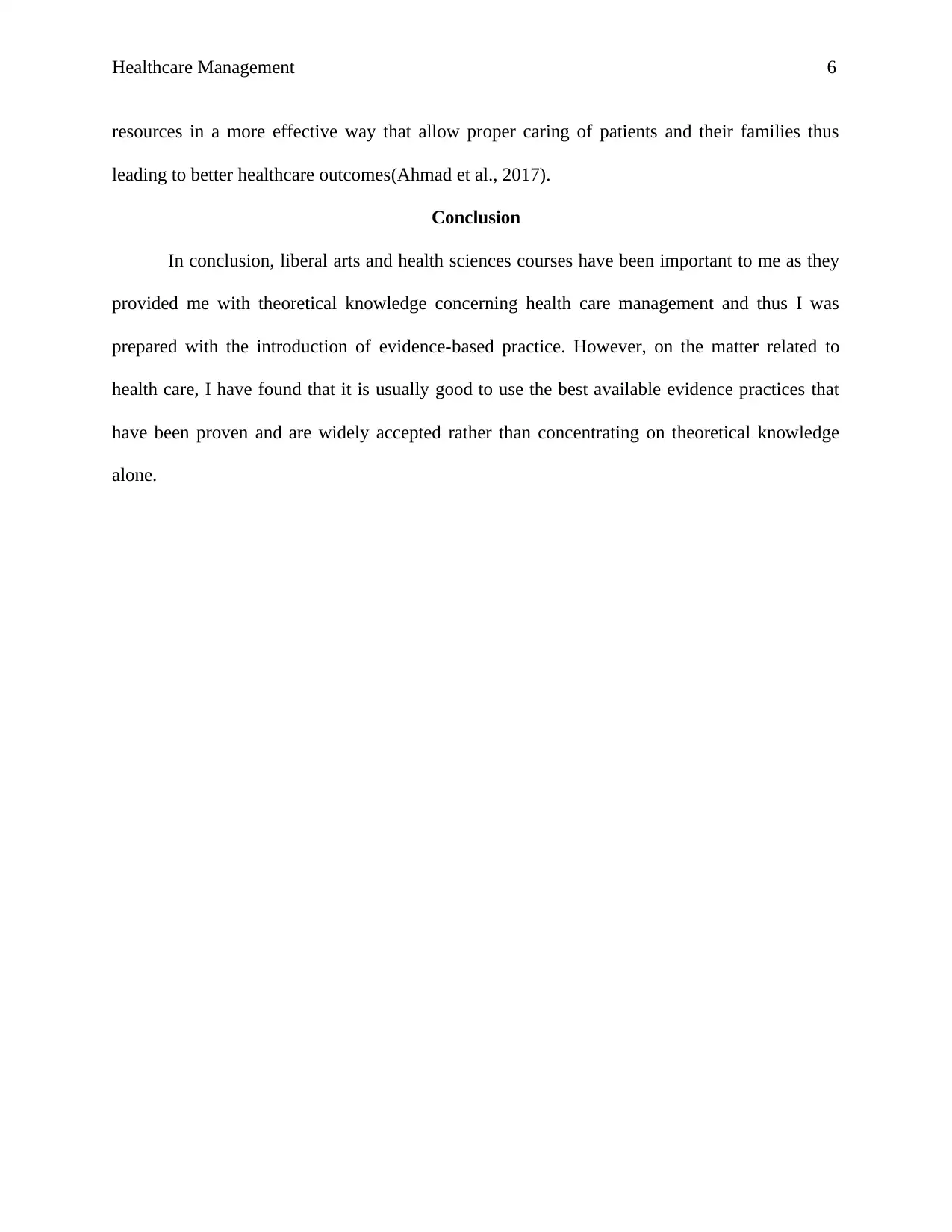
Healthcare Management 6
resources in a more effective way that allow proper caring of patients and their families thus
leading to better healthcare outcomes(Ahmad et al., 2017).
Conclusion
In conclusion, liberal arts and health sciences courses have been important to me as they
provided me with theoretical knowledge concerning health care management and thus I was
prepared with the introduction of evidence-based practice. However, on the matter related to
health care, I have found that it is usually good to use the best available evidence practices that
have been proven and are widely accepted rather than concentrating on theoretical knowledge
alone.
resources in a more effective way that allow proper caring of patients and their families thus
leading to better healthcare outcomes(Ahmad et al., 2017).
Conclusion
In conclusion, liberal arts and health sciences courses have been important to me as they
provided me with theoretical knowledge concerning health care management and thus I was
prepared with the introduction of evidence-based practice. However, on the matter related to
health care, I have found that it is usually good to use the best available evidence practices that
have been proven and are widely accepted rather than concentrating on theoretical knowledge
alone.
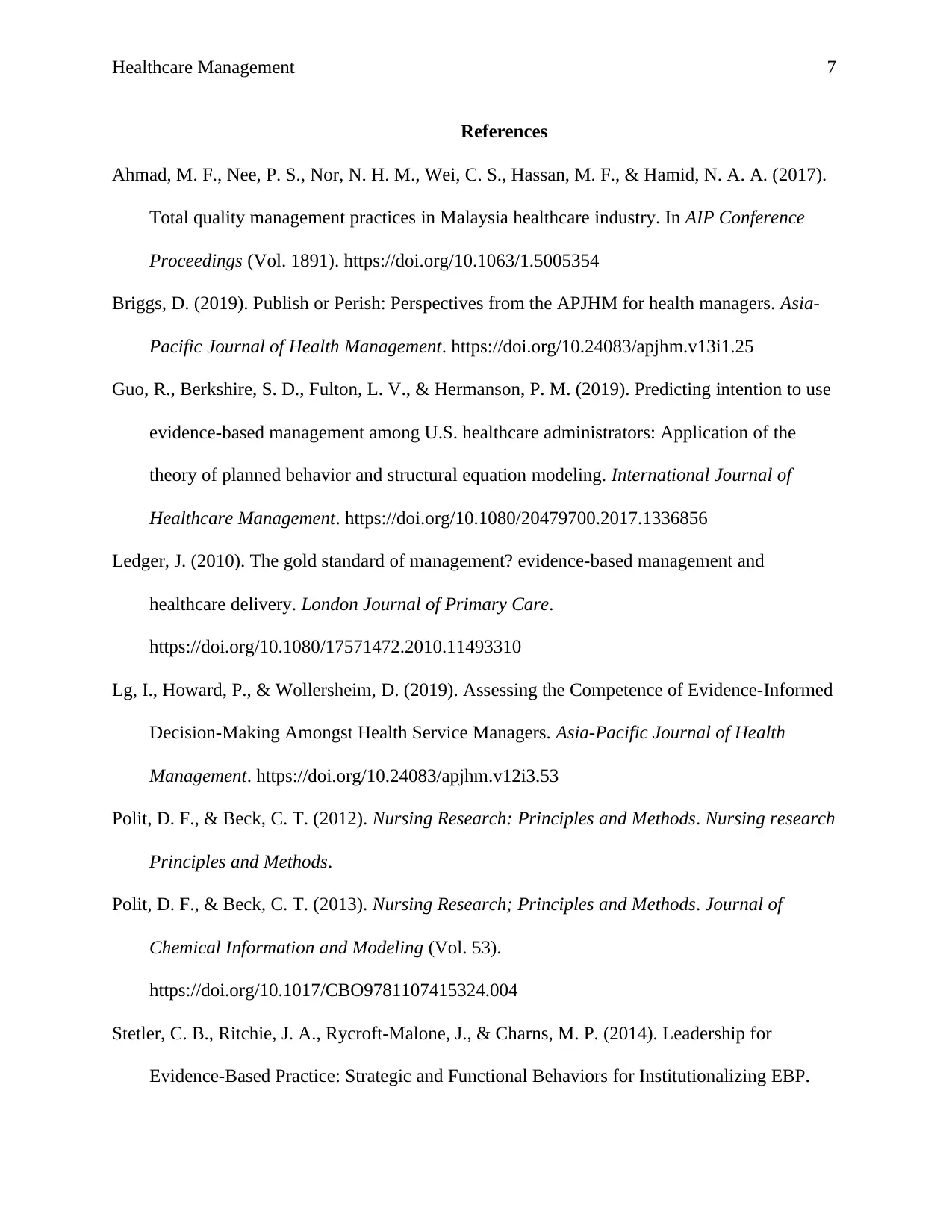
Healthcare Management 7
References
Ahmad, M. F., Nee, P. S., Nor, N. H. M., Wei, C. S., Hassan, M. F., & Hamid, N. A. A. (2017).
Total quality management practices in Malaysia healthcare industry. In AIP Conference
Proceedings (Vol. 1891). https://doi.org/10.1063/1.5005354
Briggs, D. (2019). Publish or Perish: Perspectives from the APJHM for health managers. Asia-
Pacific Journal of Health Management. https://doi.org/10.24083/apjhm.v13i1.25
Guo, R., Berkshire, S. D., Fulton, L. V., & Hermanson, P. M. (2019). Predicting intention to use
evidence-based management among U.S. healthcare administrators: Application of the
theory of planned behavior and structural equation modeling. International Journal of
Healthcare Management. https://doi.org/10.1080/20479700.2017.1336856
Ledger, J. (2010). The gold standard of management? evidence-based management and
healthcare delivery. London Journal of Primary Care.
https://doi.org/10.1080/17571472.2010.11493310
Lg, I., Howard, P., & Wollersheim, D. (2019). Assessing the Competence of Evidence-Informed
Decision-Making Amongst Health Service Managers. Asia-Pacific Journal of Health
Management. https://doi.org/10.24083/apjhm.v12i3.53
Polit, D. F., & Beck, C. T. (2012). Nursing Research: Principles and Methods. Nursing research
Principles and Methods.
Polit, D. F., & Beck, C. T. (2013). Nursing Research; Principles and Methods. Journal of
Chemical Information and Modeling (Vol. 53).
https://doi.org/10.1017/CBO9781107415324.004
Stetler, C. B., Ritchie, J. A., Rycroft-Malone, J., & Charns, M. P. (2014). Leadership for
Evidence-Based Practice: Strategic and Functional Behaviors for Institutionalizing EBP.
References
Ahmad, M. F., Nee, P. S., Nor, N. H. M., Wei, C. S., Hassan, M. F., & Hamid, N. A. A. (2017).
Total quality management practices in Malaysia healthcare industry. In AIP Conference
Proceedings (Vol. 1891). https://doi.org/10.1063/1.5005354
Briggs, D. (2019). Publish or Perish: Perspectives from the APJHM for health managers. Asia-
Pacific Journal of Health Management. https://doi.org/10.24083/apjhm.v13i1.25
Guo, R., Berkshire, S. D., Fulton, L. V., & Hermanson, P. M. (2019). Predicting intention to use
evidence-based management among U.S. healthcare administrators: Application of the
theory of planned behavior and structural equation modeling. International Journal of
Healthcare Management. https://doi.org/10.1080/20479700.2017.1336856
Ledger, J. (2010). The gold standard of management? evidence-based management and
healthcare delivery. London Journal of Primary Care.
https://doi.org/10.1080/17571472.2010.11493310
Lg, I., Howard, P., & Wollersheim, D. (2019). Assessing the Competence of Evidence-Informed
Decision-Making Amongst Health Service Managers. Asia-Pacific Journal of Health
Management. https://doi.org/10.24083/apjhm.v12i3.53
Polit, D. F., & Beck, C. T. (2012). Nursing Research: Principles and Methods. Nursing research
Principles and Methods.
Polit, D. F., & Beck, C. T. (2013). Nursing Research; Principles and Methods. Journal of
Chemical Information and Modeling (Vol. 53).
https://doi.org/10.1017/CBO9781107415324.004
Stetler, C. B., Ritchie, J. A., Rycroft-Malone, J., & Charns, M. P. (2014). Leadership for
Evidence-Based Practice: Strategic and Functional Behaviors for Institutionalizing EBP.
Paraphrase This Document
Need a fresh take? Get an instant paraphrase of this document with our AI Paraphraser
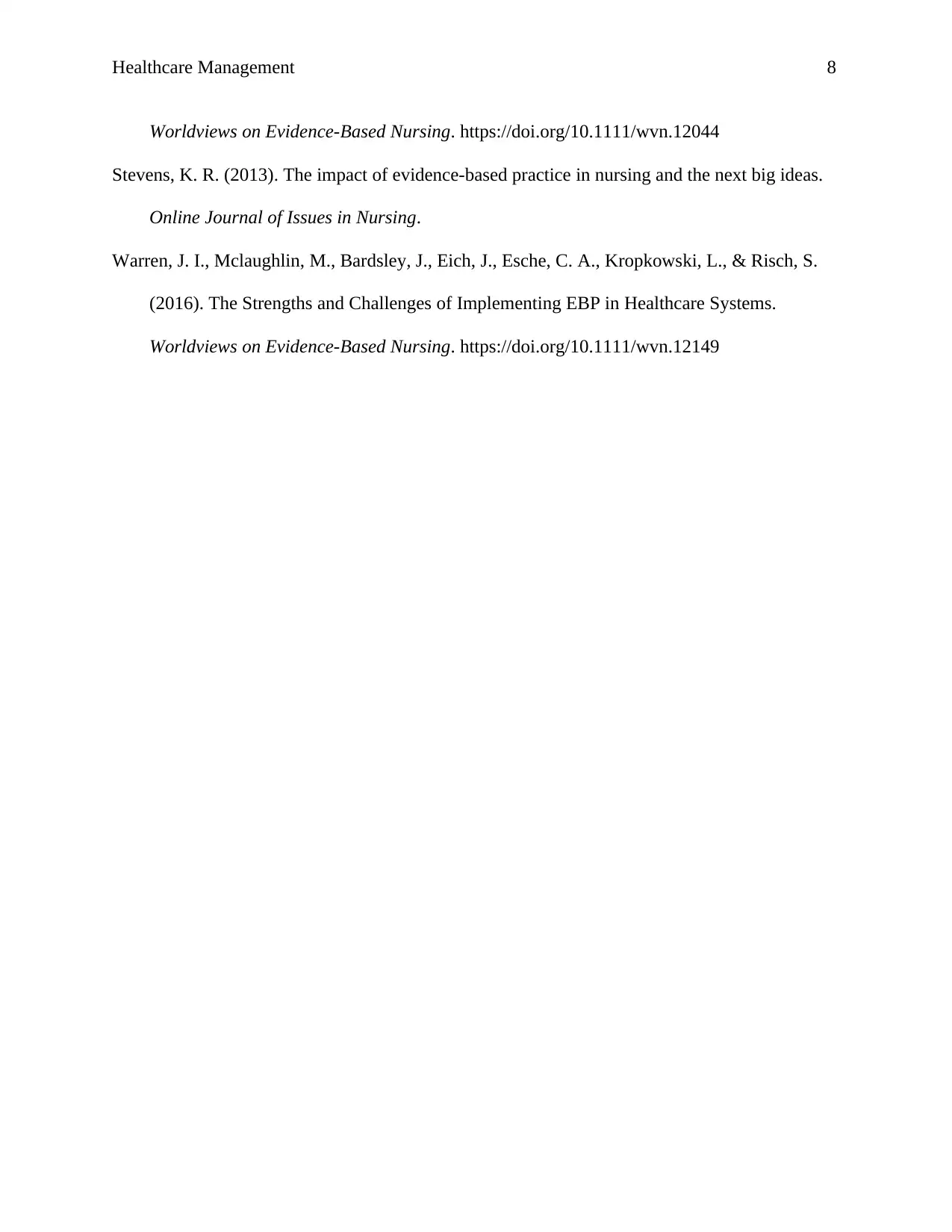
Healthcare Management 8
Worldviews on Evidence-Based Nursing. https://doi.org/10.1111/wvn.12044
Stevens, K. R. (2013). The impact of evidence-based practice in nursing and the next big ideas.
Online Journal of Issues in Nursing.
Warren, J. I., Mclaughlin, M., Bardsley, J., Eich, J., Esche, C. A., Kropkowski, L., & Risch, S.
(2016). The Strengths and Challenges of Implementing EBP in Healthcare Systems.
Worldviews on Evidence-Based Nursing. https://doi.org/10.1111/wvn.12149
Worldviews on Evidence-Based Nursing. https://doi.org/10.1111/wvn.12044
Stevens, K. R. (2013). The impact of evidence-based practice in nursing and the next big ideas.
Online Journal of Issues in Nursing.
Warren, J. I., Mclaughlin, M., Bardsley, J., Eich, J., Esche, C. A., Kropkowski, L., & Risch, S.
(2016). The Strengths and Challenges of Implementing EBP in Healthcare Systems.
Worldviews on Evidence-Based Nursing. https://doi.org/10.1111/wvn.12149
1 out of 8
Related Documents
Your All-in-One AI-Powered Toolkit for Academic Success.
+13062052269
info@desklib.com
Available 24*7 on WhatsApp / Email
![[object Object]](/_next/static/media/star-bottom.7253800d.svg)
Unlock your academic potential
© 2024 | Zucol Services PVT LTD | All rights reserved.





